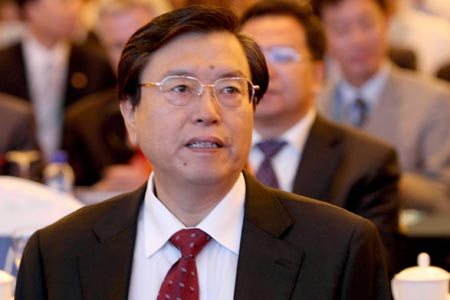This is the second in a series of posts examining the Chinese leaders expected to be named to the Politburo Standing Committee during the 18th National Congress of the Chinese Communist Party (中国共产党) that kicked off November 8.
Yesterday, I examined the background and career of Zhang Gaoli (张高丽), the Party secretary in the municipality of Tianjin.![]()
But another Zhang is expected to be appointed to the Politburo Standing Committee — Zhang Dejiang (张德江), a North Korean expert who’s been part of the wider 25-member Politburo since 2002 and who has served as a vice premier for energy, telecommunications and transportation.
Like the other Zhang, this Zhang is also 66, and he’s also a protégé of former president and ‘paramount leader’ Jiang Zemin (江泽民).
Earlier this year, Zhang stepped into the spotlight to take over from the disgraced Bo Xilai, who was forced to step down as the Party secretary of Chongqing municipality in March 2012 amid various scandals about corruption and a high-profile trial of his wife, Gu Kailai, who was convicted in August for murdering a British expat in August. Late last month, Bo was expelled from the National People’s Congress, and he’s expected to be tried for charges soon as well. It marked a remarkable downfall for Bo and the most sensational Chinese political scandal in recent memory.
Bo had attained near rock-star status as Chongqing’s leader, and his leftist ‘Chongqing model’ that featured double-digit growth along with attention to social welfare programs in the face of China’s rising inequality, as well as populist attacks on organized crime and a retro embrace of the ‘red’ culture of old-school Maoism and the songs and slogans of the Cultural Revolution, caused great discomfort among the highest echelons of the Chinese government, who determined that his anti-corruption programs were less than honest governance than the corrupt shakedowns of a leader on the verge of building his own personality cult.
Like Zhang and Xi Jinping (习近平), who is expected to become China’s new ‘paramount leader,’ Bo was a ‘princeling’ — the son of an earlier senior Party dignitary, Bo Yibo — one of China’s most powerful leaders in the 1980s and the 1990s — which makes the younger Bo’s downfall all the more remarkable.
With Zhang firmly reasserting more orthodox control over Chongqing — he denied earlier this week that a ‘Chongqing model’ even exists– he appears to have passed a key hurdle in a career that’s seen as many highlights as disappointments.
Now, it appears that Zhang will take the seat on the Politburo Standing Committee that seemed at one time virtually assured for Bo.
As noted above, Zhang’s father Zhang Zhiyi served as a major general in the People’s Liberation Army.
Zhang studied Korean in his youth and studied economics in Pyongyang in North Korea before returning to China, and his Korean expertise brought him initially to prominence when he arranged Jiang’s trip to North Korea in 1990 and, under Jiang’s patronage, rose through the ranks in Jilin province, which borders North Korea and Russia in the far northeast of China. Zhang was appointed Party secretary of Jilin province in 1995 and served until 1998, and he was credited with successfully addressing the issue of Korean immigration — about 4.25% of Jilin’s population is ethnically Korean.
Thereafter, Zhang spent the next decade at the forefront of China’s wave of economic growth (again, like the other Zhang). He served as Party secretary of Zhejiang province from 1998 to 2002. Zhejiang province, part of Shanghai’s hinterland on the south-central eastern coast of China, features 54 million people and a higher-than-average GDP per capita.
Zhang was elevated to the Politburo simultaneously with his promotion as the Party secretary of Guangdong province from 2002 to 2007. Guangdong province, in China’s coastal southeast, is the most-populous province in China with 104 million people. It’s home to Guangzhou, the heart of Cantonese language and culture, Shenzhen and the Pearl River valley, where much of China’s amazing manufacturing export growth has occurred in the past two decades, and it neighbors Hong Kong. If you see the label ‘Made in China’ on any good, the chances are likely it was made in Guangdong province.
He assumed the leadership in Guangdong province at the height of the severe acute respiratory syndrome crisis — SARS is thought to have originated in Guangdong province, and SARS claimed more than 5,000 fatalities in China before spreading to Hong Kong, Canada and elsewhere in the world. As such, as Party secretary, he’s been criticized for his treatment of protestors and journalists, and for initially attempting to conceal the scope of the SARS outbreak.
He’s held his vice premier portfolio since 2008, and in that role, received considerable criticism when 40 people died in July 2011 in the high-speed rail accident in Wenzhou.
Cheng Li, director of research and a senior fellow at the John L. Thornton China Center, contends in his profile of Zhang that he might not be the most reformist of members on the Politburo Standing Committee:
Based on his previous leadership experience and policy positions in the State Council, Zhang may continue to promote policies in favor of the development of state-owned enterprises, state monopoly, and so-called indigenous innovation (economic protectionism).
Zhang’s elevation to the Politburo Standing Committee also seems likely to mean that the current Party secretary of Guangdong province, Wang Yang (汪洋), will not ascend, as had been speculated. Wang, seen as a protégé of Hu Jintao (胡锦涛), is known as somewhat of an economic liberalizer, a proponent of inter-party democratic reform and relatively less conservative on censorship, so his exclusion — and Zhang’s inclusion — on the Politburo Standing Committee is seen as somewhat of a triumph for the Party’s conservatives.

5 thoughts on “Fifth Generation: Who is Zhang Dejiang?”